Holy Week is a period of three days which traces the sufferings and death of Christ to his triumphal resurrection. It has gone by a number of different names in Church history such as Easter Triduum or The Three Days. An evening service known as Maundy Thursday reflects upon Christ’s Last Supper with his disciples. Good Friday is set aside as a special day to ponder the trial and crucifixion of Jesus. Easter Sunday then celebrates the resurrection of the Son of God from the dead.
C. S. Lewis wrote: ““Where, except in the present, can the Eternal be met?” (Christian Reflections). And that is why the historic events which Christ enacted have been placed in a liturgical reminder so what we may relive these life transforming events through reflection and prayer.
“The New Testament writers speak as if Christ’s achievement in rising from the dead was the first event of its kind in the whole history of the universe,” wrote C. S. Lewis. “He is the ‘first fruits,’ the pioneer of life,’ He has forced open a door that has been locked since the death of the first man. He has met, fought, and beaten the King of Death. Everything is different because He has done so” (Miracles, ch. 16).
The destination of Holy Week is the resurrection of Christ. But getting there demands our retracing Jesus steps of suffering.
John the Apostle records our Lord’s servant heart on the night in which He was betrayed: “When he had washed their feet and put on his outer garments and resumed his place, he said to them, “Do you understand what I have done to you? 13 You call me Teacher and Lord, and you are right, for so I am. 14 If I then, your Lord and Teacher, have washed your feet, you also ought to wash one another’s feet. 15 For I have given you an example, that you also should do just as I have done to you. 16 Truly, truly, I say to you, a servant[c] is not greater than his master, nor is a messenger greater than the one who sent him” (John 13:12-16).
In a letter to a friend C. S. Lewis shared how to take to heart the Lord’s admonition: “In the poor man who knocks at my door, in my ailing mother, the young man who seeks my advice, the Lord Himself is present: therefore let us wash His feet” (Letter to Giovanni).
Maundy Thursday also reflects upon the Last Supper in which we are told: “And as they were eating, he took bread, and after blessing it broke it and gave it to them, and said, “Take; this is my body.” 23 And he took a cup, and when he had given thanks he gave it to them, and they all drank of it. 24 And he said to them, “This is my blood of the[a] covenant, which is poured out for many. 25 Truly, I say to you, I will not drink again of the fruit of the vine until that day when I drink it new in the kingdom of God” (Mark 14:22-25).
Different Christian traditions hold varying views of the Lord’s Table. Roman Catholics believe the bread and wine are transformed into the body and blood of Christ. Calvinists believe in the Real Presence of Christ during communion. Still others hold to the Lord’s Table serving as a reminder of Christ’s sacrifice “done in remembrance of Him.” C. S. Lewis approached the meaning of communion with a sense of awe and mystery: “Here a hand from the hidden country touches not only my soul but my body. Here the prig, the don, the modern , in me have no privilege over the savage or the child. Here is big medicine and strong magic…the command, after all, was Take, eat: not Take, understand.”
Luke 22 records the events leading up to Jesus’ arrest and series of trials. Pontius Pilate had the power to release Jesus but feared mob threats: “18 But they all cried out together, “Away with this man, and release to us Barabbas”— 19 a man who had been thrown into prison for an insurrection started in the city and for murder. 20 Pilate addressed them once more, desiring to release Jesus, 21 but they kept shouting, “Crucify, crucify him!” 22 A third time he said to them, “Why, what evil has he done? I have found in him no guilt deserving death. I will therefore punish and release him.” 23 But they were urgent, demanding with loud cries that he should be crucified. And their voices prevailed. 24 So Pilate decided that their demand should be granted. 25 He released the man who had been thrown into prison for insurrection and murder, for whom they asked, but he delivered Jesus over to their will” (Luke 23:18-24).
The Romans believed that a procurator should deal with justice. But during the trial of Jesus the threat of mob violence ruled the day. Of this Lewis reflected: “Pilate was merciful till it became risky” (Screwtape Letters).
Then when Jesus Christ went to the cross to die he did so for cosmic reasons. The death penalty which human beings received as just punishment for their disobedience would now once and for all be remedied (Genesis 3; 2 Corinthians 5:21). “Human death is the result of sin and the triumph of Satan. But it is also the means of redemption from sin, God’s medicine for man and his weapon against Satan” (C. S. Lewis, Miracles)
“It cost God nothing, so far as we know, to create nice things: but to convert rebellious wills cost Him crucifixion” (Mere Christianity, ch. 10, C. S. Lewis)
The culmination of Holy Week is a celebration of joy. As believers from varied Christian traditions awake on Easter Sunday, they do so in a common conviction that Christ is risen!
Matthew records the miraculous first announcement of the resurrection: “Now on the Sabbath, toward the dawn of the first day of the week, Mary Magdalene and the other Mary went to see the tomb. 2 And behold, there was a great earthquake, for an angel of the Lord descended from heaven and came and rolled back the stone and sat on it. 3 His appearance was like lightning, and his clothing white as snow. 4 And for fear of him the guards trembled and became like dead men. 5 But the angel said to the women, “Do not be afraid, for I know that you seek Jesus who was crucified. 6 He is not here, for he has risen, as he said. Come, see the place where he[a] lay. 7 Then go quickly and tell his disciples that he has risen from the dead, and behold, he is going before you to Galilee; there you will see him. See, I have told you” (Matthew 28:1-7).
C. S. Lewis rightly understood that to proclaim the gospel is to bear witness to the resurrection of Christ: “To preach Christianity meant (to the Apostles) primarily to preach the Resurrection. … The Resurrection is the central theme in every Christian sermon reported in the Acts. The Resurrection, and its consequesnces, were the ‘gospel’ or good news which the Christians brought” (Miracles, ch. 16).
“Each person must make their decision about the truth claims of Jesus Christ. Of this profound reality Lewis wrote:’What are we to make of Christ?’ There is no question of what we can make of Him, it is entirely a question of what He intends to make of us. You must accept or reject the story” (God in the Dock, ch. 19, C. S. Lewis).


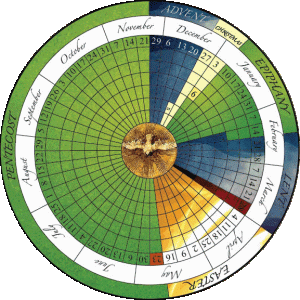
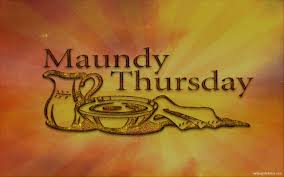
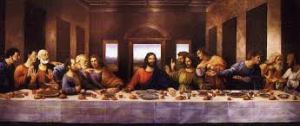
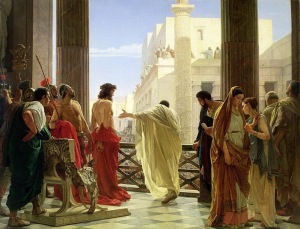

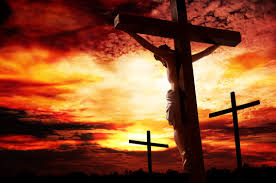
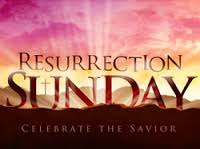
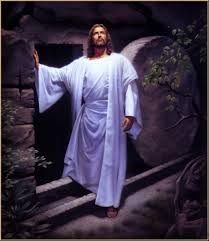
CS Lewis’ comment, “the command, after all, was Take, eat: not Take, understand.” pinpoints the distinction of participating in the Eucharist now and taking Communion then. I like what Abbot Tryphon wrote, “Heaven, the ultimate goal of all Christians, is the eternal Kingdom wherein the Heavenly Banquet (the Eucharist) is eternally celebrated, eternally offered, in worship of the Holy Trinity.
As Orthodox Christians, we find life in this celebration, for the Eucharist is not only an offering to God, but the source of life for us. Christ said, “Whoever eats My flesh and drinks My blood has eternal life.” (John 6:54). It is not a symbol or a memorial of something that took place in the past, but a place where we meet eternity. Within the celebration of the Divine Liturgy, we enter into the heavenly Kingdom, where the Church Triumphant (in heaven) unites with the Church Militant (on earth). We enter into the communion of saints!
… we need the Eucharist. It sustains us, encourages us, fortifies us, heals us, transforms us. The early Christians received whenever they gathered together, for they knew the communal participation in the eucharistic banquet was life-giving.” THE MORNING OFFERING, p47.
LikeLike
Growing up, more than a half century ago, in my teen years I can hear my pastor, to this day, reciting from memory the presentation of the “Bread” and the “Cup.” He had taken the words of scripture and formulated a complete form. For the cup, standing ramrod straight, from his military years, with a firm clarion voice to be heard by twelve hundred people he said, “In like manner our Lord took the cup, having given thanks which has been done in His Name, and said, “this cup is the New Covenant in my blood that was shed for many for the remission of sin, do this in remembrance of me until I come again.” And when the service was completed he would stride quickly to the back of the church and say, “They sang a hymn and went out.” Rather liturgical I’d say.
While certainly the primary message, for the Lord’s Supper, is of death and resurrection I always thought the use of the words “Until I come again” reminded us of the blessed hope because of this redemption. Thus, one looks back and forward.
I have often said to my students something like this, “Every generation loses something of its character.” My city, in western Michigan, in the 1940’s had a city wide “Good Friday” service from 12:00 until15:00 with different preachers expounding on the “Seven Words from the Cross.” The, 5,000 seat, Civic Auditorium was filled to capactly. Sales people and workers were given the time-off and many commercial stores closed for those three hours. Any church, worth the title, had to have a “Good Friday” service. Today, it would be difficult to find a store closed or worker given “time-off” to attend a church service. The non-liturgical church has no restraining calendar and can easily ignore such dates. Whereas, the liturgical churches carry on the traditions of bygone years, a worthy constraint. Certainly, my city is none the better for the empty church parking lots. And those that do have parking lots filled with cars remind all the passersby it’s “Good Friday.”
LikeLike
Have you ever wondered about His words recorded in Luke 22:15? “With fervent desire I have desired to eat this Passover with you before I suffer; for I say to you, I will no longer eat of it until it is fulfilled in the kingdom of God.” Why did He earnestly look forward to this meal with them?
A footnote in my Bible says, “Christ has a fervent desire for this Passover because this meal will impart the mysteries of the new covenant to His followers, and because this event will inaugurate the great deliverance of humanity from sin through the power of the Cross.”
After His resurrection he appeared to His disciples and even ate with them. Have you considered that the Passover is fulfilled even now in the kingdom of God?
LikeLike
RHSBrasil: Interesting comments about each generation losing something. This will keep in the back of my mind for some time to come.
LikeLike
Holy Week is named that for good reason. I love the hushed silence which can and to a large extent surely should accompany it. And the initial quote from C. S. Lewis is striking to me: how we can meet the eternal only in the present, as you say, through reflection and prayer. And the thought echoed by Despina that it’s a matter of tasting, not understanding (the Eucharist).
Yes, I do think Holy Week has become my favorite week of the year. But from that remembrance and participation should be a year long impact and change.
Thanks again Dennis. A stirring post indeed.
LikeLike
The power of God to take the evil intents residing in the hearts of men, and convert them into His tool for redemption of mankind through the sacrifice of Christ, His subsequent death, burial and resurrection… it is just stunning.
Coming to Him, we are not our own, we were bought with a price.
May all these thoughts and convictions keep us, by His Spirit, on the path He has for us, to glorify God in our bodies, during the time He has set for each of us to be here.
LikeLike
Certainly it is true as one theologian wrote years ago ” God ceases men and lives in them.” This is what happened to Paul and to all those who have been born again.
LikeLike